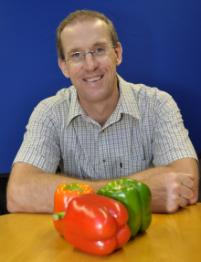CQUni graduates key to future of agricultural industry
Published on 28 June, 2012
A Senate Inquiry released last week into the skills shortage in agriculture has provided timely support for CQUniversity's decision to introduce a new science degree program specialising in agriculture and food science.
The Inquiry heard evidence that Universities produce only 700 graduates a year, but the sector needs 4,000 graduates.
Employers are also reporting difficulties in recruiting qualified staff, with national agribusiness company Elders only filling 40 per cent of advertised positions in 2010.

Professor Phil Brown CQUniversity Professor of Horticultural Science Phil Brown said CQUniversity's new science degree in Agricultural and Food Science program aims to address the tertiary skills shortage in agricultural in Queensland.
"Food production is also one of the biggest employers in the region," Professor Brown said.
"Students have the opportunity to undertake work integrated learning, taking advantage of our location in a major production centre to gain first-hand knowledge of the industry."
The programs, which are offered by distance education, aims to give students from all over Queensland the opportunity to pursue a future career within agricultural industries and in turn refuel the starving industry with job-ready graduates.
"Queensland needs more graduates to support its agricultural and food industries," Professor Brown said.
According to Professor Brown, the public were often not aware of the broad range of career opportunities available within the agribusiness industry, from unskilled manual labour through to highly-qualified and experienced academic researchers.
"Ensuring the food industry in Queensland continues to grow will require innovative people able to develop and implement new practices that increase productivity and profitability along the food supply chain while maintaining or improving our soils, water supplies and natural environment," he said.
"Science will provide many of the answers to the challenges of developing and expanding sustainable food supply systems in a changing climate and in a global marketplace where population and demand for food are rising rapidly."
Government figures estimate Queensland's food value chain is worth $18.7 billion each year and employs more than a quarter of a million people.

